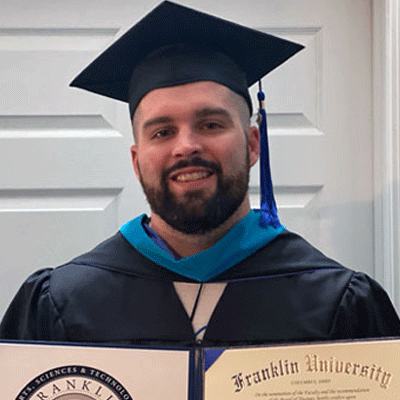Earn your MHA in as few as 14 months
Request Information
Your privacy is important to us. Privacy Policy
We're Sorry
There was an unexpected error with the form (your web browser was unable to retrieve some required data from our servers). This kind of error may occur if you have temporarily lost your internet connection. If you're able to verify that your internet connection is stable and the error persists, the Franklin University Help Desk is available to assist you at helpdesk@franklin.edu, 614.947.6682 (local), or 1.866.435.7006 (toll free).
Just a moment while we process your submission.
Advance your career with a 100% online Master of Healthcare Administration (MHA)
Position yourself for advancement and senior leadership roles in a variety of healthcare settings. Franklin's online Master of Healthcare Administration degree program prepares you to lead in the ever-changing healthcare industry.
The Franklin University Tuition Guarantee locks-in your first-term tuition rate for the duration of your degree program, for as long as you remain actively enrolled. As a student-centered university in-tune with the financial challenges busy adults face when pursuing a degree, Franklin is committed to keeping your degree within reach.
14-Month Completion
Finish your MHA faster.
Bright Job Outlook
Secure your place in an industry that's one of the nation's largest employers.
Fulfilling Work
Drive positive change and make a lasting impact.
Transform Patient Care
Align goals and resources with emerging needs and trends.
Top-Notch Networking
Learn from faculty and peers who are in-field professionals.
100% Online Classes
Take classes that fit with your busy life.
Contemporary Curriculum
Be at the forefront of trends and technologies.
Hear What Our MHA Graduates Are Saying

"Franklin University has provided a supportive environment for students like myself who are balancing busy schedules and want to advance their education."

"Franklin University's Master of Healthcare Administration program fundamentally taught me about myself. This program has helped prepare me to become the best healthcare professional possible and helped me become a continuous and lifelong learner."

"Obtaining my master's degree in healthcare administration allows me to expand my horizons and my career."

"Earning this degree has allowed many doors to open professionally and I made a lifelong friend in one of my classmates."

"This accomplishment gives me the ability to have a greater impact and give back to healthcare in our community."
MHA Program Coursework
The purpose of this course is to provide students with the fundamental concepts and calculations associated with financial accounting and managerial accounting within a healthcare organization. Students will study the foundational aspects of financial accounting with a primary focus on financial statements and the uses of the information in these statements. Students will also study the functional aspects of managerial accounting to include cost behavior, cost allocation, pricing, planning, budgeting, profit analysis, and performance evaluation. Application of these concepts will include analysis of case studies.
The course provides an extensive overview of leadership in the U.S. health services system. The focus of the course will be on the role health services leadership plays in the delivery of healthcare services, to include managing with professionals, financial management, services utilization, and other aspects of the U.S. healthcare system. The student will explore the key theoretical and practical elements of leadership as well as current issues clarifying how the U.S. health services system is organized, managed, and financed.
In this course students will develop a strong foundation in health law, enabling them to deal with the common legal, practical, moral, and ethical issues that healthcare organizations face on a daily basis. Topics will include statutory law, rules and regulations, tort law, criminal law, contract law, civil procedures, and trial procedure.
This course will explore the essential conceptual and analytical understanding of health policymaking and politics, including their impact on health administration and leadership. Selected policy issues will be explored through the application of political concepts and behavioral models, including a system model of policymaking. The emphasis will be on understanding the health leader?s approach to the policymaking system, become involved in it, and work through it to attain their objectives and those of their organization.
Students will explore concepts and theories of operations management. The student will develop both knowledge and skills in solving the operational problems of healthcare organizations. This course will examine process improvement models that are aimed at improving the safety and quality of healthcare delivery within an organization.
The student will examine principles of strategic management applied to healthcare organizations. This Capstone course through critical assessments of the real world environment and case studies on strategy formulation, implementation, and evaluation will examine alternative strategic frameworks for healthcare organizations. Topics will include, mission, vision statement development, environmental assessments, analysis of strengths, weaknesses, opportunities and threats, use of critical success factors, development of business plans, and other techniques for strategic planning and management.
MHA:
The student will examine demographic measurements, epidemiological methods, outcomes assessment, health promotion, and disease prevention from a global perspective.
This course covers the broad spectrum of strategic issues in healthcare including policies, guidelines, standards, processes, and controls required to manage and implement enterprise-level information. Treating information as a strategic asset to healthcare organizations, processes to manage various risks to the quality of information and ensure its appropriate use are covered.
AND
This course explores requirements for clinical workflows in a variety of inpatient, outpatient, and emergency healthcare environments. It covers the documentation, review, mapping, and diagramming of clinical workflow information and processes. The course also covers the linkages between the improvement of patient care to workflow mapping and change management, as part of evidence based decision making in healthcare.
This course addresses the process of retrieving, analyzing, and reporting intelligence to make healthcare decisions. It covers the techniques of extracting, transforming and loading data from a myriad of operational databases into corporate data warehouses, as well means to ensure that decision making is based on clean and reliable information. The course also includes ways to report the healthcare intelligence gathered.
The purpose of this course is to train individuals in Lean Six Sigma skills and strategies to improve processes and provide safe, effective care environments. The learner will demonstrate the practical application of tools utilized with Lean Six Sigma methodologies. Students will have the opportunity to apply the knowledge learned during this course concurrently with a case study designed specifically to use Six Sigma methodologies. Students will develop a Lean Six Sigma project plan that can serve as the foundation for completing a major project for Lean Six Sigma certification following the completion of the course. Interested students would need to apply for Lean Six Sigma certification and complete the major project with Franklin University's Center for Professional Training & Development.
This foundational course provides an introduction to the social, economic, political, and ethical context of public administration in the United States. Students examine how public sector values differentiate government from the private sector and develop skills for critically evaluating issues faced by public administrators.
This course will explore the psychological influences on the development and behavior of managers and organizational leaders. Topics include: follower influences, nature vs. nurture in the development of leaders, relationship of personality to leadership style, behavioral decision- making biases, tactical, operational, and strategic decision-making , group think, and scenario planning.
Organizations are composed of groups of people who work together to achieve defined outcomes. Experience has proven time and again that the key factor which differentiates successful companies from those who struggle to survive is people who make up the employee base. While the human resources function is given the specific task of planning for and resolving many employee-related issues and needs, individual managers have direct responsibility and accountability for motivating and leading employees to achieve sustained organizational success. The purpose of this course is to provide students with the knowledge and skills needed to work effectively with human resources to enhance the contributions of all employees to organizational effectiveness. Students will learn about the elements which drive business success, theories of motivation, and methods for creating a plan for maximizing the human capital of an organization.
OR
Organizational Leadership Specialization:
This course provides an overview of the historical and current leadership concepts, theories and constructs. Application and assessment of the individual leadership style will enable the student to develop their leadership voice. This course will provide a construct that will enable the student to identify transferrable skills that align with the organization that they are serving in. This course will challenge students to assess their own leadership strengths and weaknesses and produce an in-depth plan of action to develop and refine leadership competencies. Students will conduct substantive scholarly research to address and capture relevant and cutting-edge leadership theoretical work for application in course assignments.
This course focuses on research and evaluation of the key theoretical concepts and practices central to the leading of organizational change initiatives. Students will evaluate real-world situations in a manner that supports the ability to initiate, implement and sustain major change. The management of change is a dynamic process. This course focuses on understanding how to plan and implement change in various organizations and other settings.
This course will explore the psychological influences on the development and behavior of managers and organizational leaders. Topics include: follower influences, nature vs. nurture in the development of leaders, relationship of personality to leadership style, behavioral decision- making biases, tactical, operational, and strategic decision-making , group think, and scenario planning.
OR
Operational Excellence Specialization:
The purpose of this course is to train individuals in Lean Six Sigma skills and strategies to improve processes and provide safe, effective care environments. The learner will demonstrate the practical application of tools utilized with Lean Six Sigma methodologies. Students will have the opportunity to apply the knowledge learned during this course concurrently with a case study designed specifically to use Six Sigma methodologies. Students will develop a Lean Six Sigma project plan that can serve as the foundation for completing a major project for Lean Six Sigma certification following the completion of the course. Interested students would need to apply for Lean Six Sigma certification and complete the major project with Franklin University's Center for Professional Training & Development.
In today's business environment, the success of organizations depends on the effective and efficient management of operations. Methods to select, plan, and improve organizational processes will be examined. The application of optimal capacity decisions in supply chains, development production, and inventory plans and schedules will be performed. The student will learn quality management and improvement process to increase the efficiency of a process.
Operational excellence can provide an important competitive advantage for firms in today?s marketplace. This course presents the concepts in quality. It builds upon the responses of six sigma and lean principles. This course also blends qualitative and quantitative information so that organizations can capitalize on opportunities and data driven management.
OR
Human Resources Specialization:
The primary purpose of this course is to introduce the principle theories and practices in the area of employment and workplace law. Topics include the federal and state laws associated with hiring, firing and discipline, medical leave (including FMLA, ADA and worker's compensation), discrimination, harassment, immigration, labor law, unemployment compensation, workplace privacy. Additional topics may include workplace investigations, workplace violence and employment-related legal processes, including EEOC Charges and lawsuits.
This course addresses the need for planned change focused on an organization's ability to compete strategically. The framework of consultation as helping organizations reach a level of optimum performance will be applied. Topics addressed include individual, team, and organization-wide interventions that can raise productivity/quality, improve competitiveness, increase skills, morale, and commitment.
The course will introduce students to the field of strategic human resource management (SHRM). Current topics in SHRM that have resulted from environmental and organizational challenges, e.g., technology, globalization, legislation, restructuring, work/life balance, changing labor markets, are discussed Emphasis will be placed on problem solving issues, policies, and practices affecting HR specialists, practitioners, and managers.
Health Informatics:
This course explores requirements for clinical workflows in a variety of inpatient, outpatient, and emergency healthcare environments. It covers the documentation, review, mapping, and diagramming of clinical workflow information and processes. The course also covers the linkages between the improvement of patient care to workflow mapping and change management, as part of evidence based decision making in healthcare.
This course addresses the process of retrieving, analyzing, and reporting intelligence to make healthcare decisions. It covers the techniques of extracting, transforming and loading data from a myriad of operational databases into corporate data warehouses, as well means to ensure that decision making is based on clean and reliable information. The course also includes ways to report the healthcare intelligence gathered.
AND
Adding a focus area provides an opportunity for customization but is not required for completion of the degree. The focus area requires two additional courses.
MHA Program Details
| 2024 - 2025 Tuition | Cost Per Credit |
|---|---|
| Standard tuition per credit hour | $670 |
| Nursing programs MSN-FNP, MSN-PMHNP, MSN-AGPCNP, Post-Graduate FNP Certificate, Post-Graduate AGPCNP Certificate and Post-Graduate PMHNP Certificate | $670 |
| MSN-Generalist, MSN-Nurse Administrator and MSN-Nurse Educator | $598 |
| RN-MSN Pathway (NURS 500) | $298 |
| Current service members | $536 |
| Master's Prerequisite Courses (500 level) | $398 |
| Master's Prerequisite Courses (500 level) - International Students | $526 |
Know the Total Cost of Your Master’s from Day One
Save yourself the anxiety of annual tuition increases with Franklin’s Tuition Guarantee. The guarantee lets you lock-in what you’ll pay from first-term through graduation, as long as you remain actively enrolled. Not only will this help you maximize funding sources - like employer reimbursement or financial aid, it will keep you focused on earning your degree.
A learning outcome map functions as a roadmap to help guide students' progress through their program of study. Click HERE to view the Master of Healthcare Administration matrix.
To be awarded a graduate degree, students must:
- Successfully complete all required curriculum courses.
- Maintain a minimum cumulative grade point average (GPA) of 3.00.
- Complete the residency requirement:
- Master of Healthcare Administration students must earn least 24 of the 36 required credits at Franklin University.
- Complete the payment of all requisite tuition and fees;
- Not to be under disciplinary dismissal due to academic dishonesty or violation of Student Code of Conduct.
Transfer credit awarded based on experiential learning shall not count toward the residence requirement at Franklin University.
The admission process reflects Franklin University’s efforts to clearly identify the performance standards that can help predict student success in graduate level study. The selection criterion for Franklin’s graduate programs, as determined by faculty, emphasizes academic ability, contributory work experience, and personal qualities and characteristics.
Requirements for admission include having earned a bachelor's degree from an institution accredited by the Accrediting Commission for Community and Junior Colleges, Western Association of Schools and Colleges (ACCJC), Higher Learning Commission (HLC), Middle States Commission on Higher Education (MSCHE), New England Commission on Higher Education (NECHE), Northwest Commission on Colleges and Universities (NWCCU), Southern Association of Colleges and School Commission on Colleges (SACSCOC), WASC Senior College and University Commission (WSCUC), or a Council for Higher Education Accreditation (CHEA)-recognized accrediting organization with a GPA of at least a 2.75 on a 4.0 scale.
Applicants who earned at least a 2.5 GPA on a 4.0 scale in their earned bachelor’s degree will automatically be granted conditional enrollment status. Applicants who earned lower than a 2.5 GPA on a 4.0 scale in their earned bachelor’s degree can petition for conditional enrollment status to the program chair by submitting an essay and résumé detailing other criteria that the applicant believes should be considered to demonstrate their ability to be successful in a graduate program. This petition could include details on the applicant’s work experience, work ethic, level of professionalism, personality characteristics, level of difficulty of program of study previously completed, etc.
Conditional enrollment requires students to achieve a final grade of “B” (3.0 GPA) or better in the first graduate-level course of their program. If the terms of the conditional enrollment are not met, the student will not be allowed to advance in their program and will be unable to earn this graduate degree from Franklin University.
Program Prerequisites
None
English Language Testing & TOEFL IELTS
Prospective students must demonstrate English Language Proficiency. The requirement is met through any of the following:
- The applicant is a citizen of a country where English is the official language.*
- The applicant has received a bachelor’s degree (or higher) from an institution located in an English-speaking country in which the courses were taught in English.*
- The applicant has earned appropriate scores on language proficiency exams taken within the last two years, as listed in the Academic Catalog.
*For more information about English proficiency, including a list of English-speaking nations, please visit our International Students section.
About Franklin University

Dedicated to Helping Ambitious Adults Succeed Since 1902
Get the support you need to achieve your goals at Franklin. Our streamlined processes and easy access to free academic support resources, minimize the obstacles standing between you and your degree. Accredited, nonprofit and wholly focused on adult learners for more than 120 years, Franklin makes it possible for you to earn an employer-respected degree 100% online.
- Degrees
- Microcredentials & Certificates
- Admissions
- Tuition & Financial Aid
- Transferring Credit
- The Franklin Experience
- About Us
- FranklinWORKS Marketplace
- Safety & Security
- Policy Information
- Your Privacy Settings
- Privacy Policy
- Terms of Use
- Careers At Franklin
- Sitemap
Franklin University
201 S Grant Ave.
Columbus, OH 43215
Local: (614) 797-4700
Toll Free: (877) 341-6300
admissions@franklin.edu
Copyright 2025 Franklin University
Franklin University is accredited by the Higher Learning Commission (hlcommission.org/800.621.7440) and authorized by the Ohio Department of Higher Education.
Franklin University is committed to being an inclusive community free from all forms of discrimination and harassment.
Your privacy is important to us. Privacy Policy